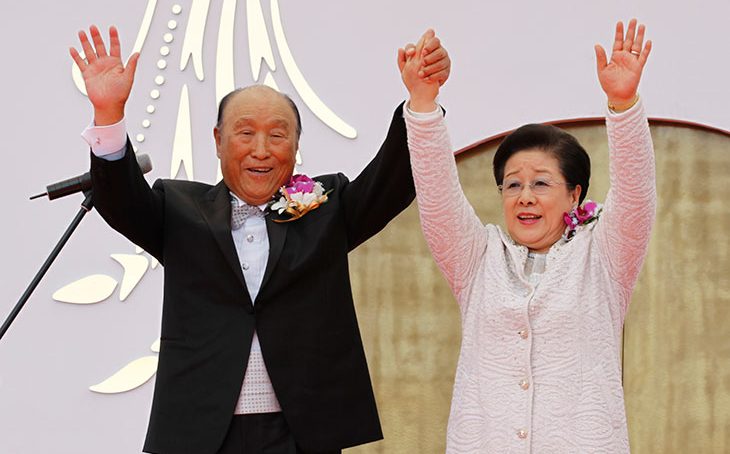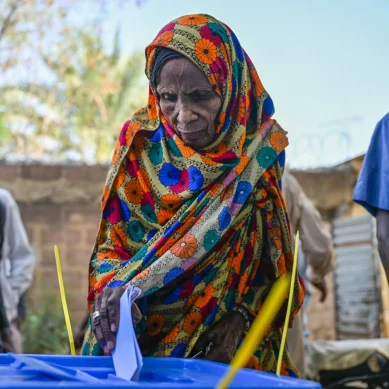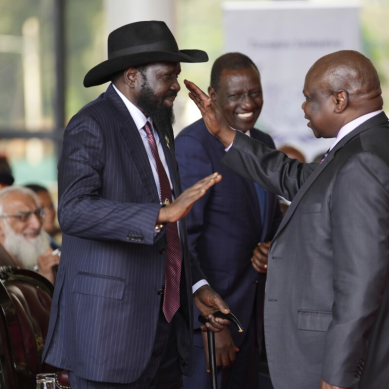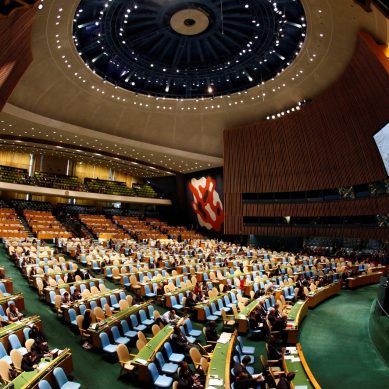
Early one morning in July of last year, about 30 Paraguayan anti-narcotics officers flew into a vast wooded wilderness known as the Chaco to raid five airplane landing strips used by drug traffickers.
Situated in northern Paraguay, a small, landlocked South American nation, the isolated Chaco has in recent years become a key trans-shipment point for gangs trafficking Andean cocaine to booming European markets.
Of the five landing strips raided on July 6, 2022, four were on land owned by South Korea’s Unification Church, Reuters found by cross-referencing the coordinates of the runways with a map of the church’s Chaco holding.
Reverend Sun Myung Moon, the late self-proclaimed messiah who founded the Unification Church in 1954, became one of Paraguay’s largest private landowners when he bought the Chaco plot nearly 25 years ago as part of a religious and commercial expansion into Latin America. The church, which has often been labeled a cult by critics, is best known for its mass weddings and an opaque international business empire.
Two senior Paraguayan anti-narcotics officers provided Reuters with 11 coordinates of Chaco landing strips allegedly used by drug gangs. By plotting those points on a map of the Moon holding, provided by a church source, Reuters identified at least five different airstrips on the property, including the four involved in the July raid.
Paraguayan drug-enforcement authorities last July raided clandestine airstrips, including the one shown here, in a remote section of the country. Many of the runways are on land owned by the Unification Church of South Korea, founded by Rev Sun Myung Moon. Photos from the Twitter account of SENAD Paraguay.
Authorities found no drugs or planes during the operation and made no arrests. But there were rustic shacks next to the runways with basic provisions, beds and radio equipment, according to two Paraguayan officials present. A few days later, a team with construction equipment and explosives arrived to destroy the runways and render them inoperable, one of the officials said.
Reuters found no evidence the Unification Church or its members were involved in the drug-running targeted by the raids, or that it controls airstrips in the Chaco, an area authorities in Paraguay describe as lawless.
Michelle Byun, the lawyer for The Holy Spirit Association for the Unification Of World Christianity, as the church’s Paraguayan branch is formally known, said in a statement that the church is aware of illegal activity on its land and is cooperating with law enforcement.
“Both the Church, with its headquarters in Korea, and its members advocate for peace,” Byun said. “In no way is the Church involved in illegal acts.”
The Chaco raids point to a serious challenge for authorities combating the surging international cocaine trade. Paraguay has scant oversight of its national airspace and no radar tracking at all in the Chaco, prosecutors say. That allows drug gangs to fly undetected into the sprawling woodland with shipments of Bolivian or Peruvian cocaine.
They land their planes on clandestine airstrips, which are often little more than rutted tracks carved out of the forest. The drugs are then smuggled by land or riverboat to Atlantic ports in Brazil, Uruguay and Argentina, before heading east on Europe-bound container ships.
The Unification Church is a major power in this unruly region. Moon, its founder, first visited the Chaco in the 1990s to fish the Paraguay River. In 2000, he bought the roughly 600,000-hectare plot from an Argentine agricultural conglomerate, paying $22 million for an area roughly ten times the size of Manhattan.
Drug enforcement authorities say this remote area of northern Paraguay, known as the Chaco, has become a hub for global cocaine trafficking. These four airstrips were raided by anti-drug agents in July of 2022. All are located on land owned by South Korea’s Unification Church.
Moon’s purchase of the secluded and inhospitable Chaco tract confused many in Paraguay.
In his 2009 autobiography, Moon described himself as part of “a global environmental movement to preserve the living creatures” of the Chaco “in the pristine state in which God created them.” He said he hoped to transform the “long-neglected land” into an earthly paradise and a base for his supporters.
But the church quickly ran into problems in the Chaco that continue today.
Ever since Moon’s purchase, residents of a small town inside the holding have fiercely contested the church’s ownership. After Moon’s death in 2012, his relatives split the church into three rival sects, two of which are waging a long-running legal battle over who owns the Chaco plot. More recently, drug traffickers have muscled in on the territory.
The July 6 raids were part of a probe into a smuggling gang led by alleged trafficker Miguel Ángel Servín, according to Paraguay’s SENAD anti-narcotics agency and the lead prosecutor in the case.
Servín was arrested in 2021, the year before the raid, on charges of drug trafficking and criminal conspiracy. The investigation began with the 2020 seizure of 3.4 tonnes of cocaine by Belgian police in Antwerp, Europe’s main port of entry for the drug. The cocaine, hidden in a shipment of Chaco-made charcoal, was traced back to Paraguay, according to the indictment seen by our reporters. Servín remains in prison, awaiting trial. Servín’s lawyer, Rodrigo Alvarez, said his client maintains his innocence.
Elva Cáceres, the lead prosecutor in the Servín case, confirmed to Reuters that some of the landing strips raided in July 2022 were located on church land. She said she was not aware of the church or any of its officials being involved in drug trafficking.
Byun, the Unification Church lawyer, provided Reuters with an April 2022 document the church sent to Paraguayan anti-narcotics prosecutors, urging an investigation into potential illicit activity. The document mentioned a May 2021 seizure of 449 kilogrammes of cocaine on its land and also flagged the likely existence of narcotics runways within its boundaries.
Marco Alcaraz, one of Paraguay’s top anti-narcotics prosecutors until his retirement last week, confirmed he had received the document and passed it on to SENAD for further investigation.
One prominent Paraguayan with close ties to the church has been convicted of a drug-related crime: Cynthia Tarrago, a member of Paraguay’s Congress between 2013 and 2018 and the regional president of a church offshoot organisation.
In Paraguay, where the Chaco acquisition has long been contentious, the church has cultivated close ties with presidents, politicians and supreme court justices. Some have been granted senior positions in the church or its many offshoot organisations.
Tarrago was one of them. In 2017, she was named president of the South American chapter of the International Association of Parliamentarians for Peace (IAPP). Byun, the church lawyer, was named secretary general. Launched in 2016, the IAPP recruits legislators from around the world who are committed to advancing church goals.
- A Reuters report











